- Home
- Justin Bell
Darkness Rising Page 2
Darkness Rising Read online
Page 2
The truck bore down on the sports car as traffic grew more congested, and the slender vehicle ran out of room to move. It made an attempt to pass traffic on the right shoulder, but ground into the guardrail, throwing sparks as the vehicle slowed and the truck moved over behind it. Houston slammed on the roof.
“You in the red car! Pull over!”
The vehicle surged left, breaking free of the guardrail and roared forward, but the truck was close behind.
Up ahead the exit sign for Sausalito loomed large and without warning the sports car jolted left, then angled right and screamed forward, hauling down the exit ramp into town.
Agent Lopez slammed down on the accelerator, sending the truck charging forward, a black blur underneath the light purple sky. The red car almost made the turn, but the truck plowed into its right rear end, picking it up and spinning it wildly. Tires screeched along the pavement, followed by a deafening smash of thin, Italian metal twisting around a light pole.
Houston vaulted from the rear of the truck, lifting his carbine.
“Don’t move!”
The passenger door opened, a man spilling out with a duffel bag wrapped tightly around his shoulders. His foot caught on the door and, as he hit the road, the bag skidded out from around him.
“I said don’t move!” Houston took another step towards the fallen man.
A swift trio of pops echoed from behind the car as one of the passengers peeked up and fired a small pistol towards Agent Houston. Houston shifted slightly, twisting at the waist, tracking the shooter and firing at the same time as Jameson did, cutting the man down in a cross fire of 5.56-millimeter rounds.
When Houston turned back to the man on the pavement, his arm was elbow deep inside the bag.
“I said don’t move—”
Houston didn’t see the man’s fingers move inside the bag, but they did. Clenched tight around a fist-sized triggering mechanism, the man glared face-first into Agent Houston’s narrowed, angry eyes and detonated the device.
Introduction
Perhaps the most frightening weapon the world has ever known is classified as a nuclear weapon. Developed as an offensive tool of destruction, the first nuclear weapons were used in 1945 when the United States dropped atomic bombs on the Japanese cities of Nagasaki and Hiroshima. The effects were utterly devastating, and since that day, the world at large both respects and fears the potential these weapons can bring.
For decades, the United Nations and their representatives have fought for non-proliferation of nuclear weapons, an agreement that many countries in the world will halt or slow development of these incredibly destructive, powerful weapons which hold within them the power to end the world as we know it.
Far from just the raw impact of a nuclear detonation, certain explosive devices have the capacity to disperse lethal radiation into the air, which would not just kill thousands of citizens within the immediate vicinity, but spread to surrounding areas, causing long term sickness and death for generations to come.
Ever since the evolution of tactical nuclear devices in the 1950s and 1960s, the concept of a “suitcase nuke” has been discussed and theorized, with both the United States and Soviet Union claiming to be able to develop these miniaturized weapons of mass destruction. To date, no concrete examples of these devices have been shown to exist, though throughout international intelligence circles, it is believed that many major countries of the world have successfully developed prototypes.
While a full blown nuclear missile such as the ICBM that North Korea tested in 2017 is typically measured in tens to hundreds of kilotons, it is believed that any device retrofitted for a smaller suitcase design would be significantly lower in explosive yield.
An ICBM with a yield of 150 kilotons striking San Francisco would almost immediately kill a quarter of a million people, with nearly 850,000 people within range of fatal radiation doses. Radioactive fallout could disperse as far as 2,500 miles from the impact zone and create catastrophic effects throughout the entire western United States.
American Intelligence agents theorize that while most of the world’s attention is on North Korea’s capacity to launch ICBM’s, the nation is actually secretly developing a prototype “suitcase nuke” capable of being transported to and within the United States for detonation in mass casualty areas. This would allow for several coordinated attacks without warning, giving North Korea the ability to bring American infrastructure to its knees without even having the opportunity for a coordinated nuclear counter attack.
The National Security Agency has run several algorithms based on the potential for these smaller devices—which technically aren’t transported in suitcases, but in larger canvas duffel bags or specially designed backpacks—to infiltrate the country’s borders.
One of these prototype devices is estimated to yield as much as twenty kilotons of impact power, a remarkable feat of engineering considering the smaller footprint of these devices.
If one of these twenty-kiloton devices was detonated within San Francisco, even at a remarkably smaller yield, the initial death toll would still reach nearly 120,000 civilians with the capacity of impacting nearly 375,000 depending on the population density at the time. Fallout could spread as far as 420 miles and devastate an entire region with the detonation of a single device.
If a rogue nation were able to smuggle multiple devices within American borders and detonate several of them in a calculated and coordinated attack on the United States’ infrastructure, the impact could be beyond catastrophic. It could be apocalyptic.
To date, various government agencies have run analysis and testing on this eventuality, but so far, there has never been concrete proof that any nation of the world got beyond the theoretical phase.
No concrete proof that these devices did, or ever would, exist.
No proof at all…until now.
Chapter 1
“…you act like it’s the end of the world.”
Phillip looked up from the screen of the smart phone clamped between his fingers. “Huh? What did you say?”
“Oh, come on, Phillip. This is supposed to be a vacation. Just because you go a half an hour without checking your email doesn’t mean it’s the apocalypse.”
His eyes darted back to the phone. “There’s no cell service out here, anyway.”
“Brisbee, Colorado. The land that time forgot,” Winnie said from the back seat, rolling her eyes in typical teenage girl fashion. Like her father, she also held a device in her hand, though without the cellular signal, it might as well have been a ten-ounce stone.
“Oh no,” said Max in a whining, sarcastic tone. “No cell signal, whatever will you do?” Sarcasm was second nature for the thirteen-year-old little brother, and it was just sharp enough to dig at his older sister in just the right way.
“Shut up, asswipe,” Winnie snapped back, though she grinned lightly as she punched his arm.
“Hey, watch your mouth! Do you two need to step outside?” Rhonda said from the front seat. She turned her head briefly to shoot an unimpressed look back at her fifteen-year-old daughter, who seemed summarily unaffected.
Phil turned back from his side and gave Winnie a sideways glance.
“Sorry, daddy,” she said in an innocent teenager voice that bordered sincerity and sarcasm.
Rhonda turned back to face the road, easing the car back in her lane to compensate for the left drift towards the shoulder while she wasn’t paying attention. Beside her, her husband continued to stare entranced at the non-functional device.
“Can’t you put that away? We’re coming up here to enjoy a long weekend, hopefully without interruptions at work.”
“I know, honey, I’m sorry. I’ve just got a J Co inspection next week,” Phillip replied, referring to the Joint Commission, a federal agency that regulated the performance and safety of nationwide health systems.
“Yes, and I’m sure one of those seven emails you can’t read right now will solve all of your problems.”
“Just this weekend?” Rhonda asked. She said it like a joke but with just enough truth to sting.
“Jeez, mom and dad,” Winnie said. “Can you guys go one three-hour drive without grumping at each other?”
“If you and your brother can, we will,” Rhonda replied.
Winnie shook her head. “If you guys gave Max as much crap about stealing stuff as you do to me about how I talk, maybe he wouldn’t be a klepto.” She immediately regretted her choice of words the moment after she said them.
“Shut up!” Max shouted, punching his older sister in the arm.
“Hey, ow!” she shouted back, recoiling. She flashed an angry look at her younger brother, then her eyes drifted to Bradley who was sitting in the third-row seat behind them. One of Max’s only friends at their private school, Brad had grown up in urban Denver, Colorado and other than attending their school, had never ventured far outside the city. His parents had eagerly accepted the Fraser’s invitation to join them on this long weekend trip to the cabin in the mountains. He was a year younger than Max, but very bright and mature for his relatively young age, and the two had bonded quickly.
Winnie was at the age where she didn’t like her brother much, but she was smart enough to know that he had his issues, and embarrassing him in front of his only friend at school would not help those issues. That could make this an even longer long weekend.
She bit off the words that had formed on her lips and remained silent, turning back to look forward out the windshield.
“Did you tell your parents we’re coming?” Phil asked, straightening himself and glancing out his window. As he watched they passed by a small gas station with two pumps outside a small building with shoddy red siding and a slowly turning Gulf sign reaching up towards the early morning sky. Just like you might expect from small town Colorado, there were more trees lining these narrow, cracked pavement streets than buildings.
“No. It’s their summer cabin, they don’t usually come out here until June.” Rhonda eyed the small vehicle ahead of her, a Ford pickup that seemed to age before her very eyes, rust littering the bent metal tailgate. A thin cloud of blue exhaust puffed from the rear right corner, then burst out and spread into the sky as the truck accelerated. She glanced back at the empty road, eased her Honda minivan past the old beater, and ignored the flash of anger she received from the driver. His eyes narrowed beneath a mop of graying hair and his arm twitched underneath the red flannel shirt acting as if he might have prepared to throw the middle finger at her.
She eased the van back over to the right hand lane, eyeing the rear view mirror, but the truck just drifted further back into the horizon.
“Are you sure it’s usable?” Phil asked.
“Define usable.”
“I don’t know, running water? Electricity?”
Rhonda sighed. “It’s a cabin, not a cave, Phillip. Yes, it’s got full plumbing and electricity. Mom and dad told us we could use it anytime, and I’m taking advantage of it.”
As if on cue, Winnie leaned forward on her elbows. “Please tell me this place at least has Wi-Fi.”
Rhonda smirked and looked at her daughter in the mirror. Winnie brushed aside a thick clump of curly, brown hair, her eyes alert, waiting in breathless anticipation for the answer that would most assuredly make or break her entire weekend.
“I haven’t been here in probably fifteen years, sweetie,” Ronda replied. “There was no Wi-Fi back then, I can tell you that.”
“Seriously?” she asked leaning back into her seat, aghast.
“Grandma and Grandpa can’t live without Wi-Fi, can they?” Max cut in.
Rhonda’s face shifted, clenching into carved stone, her eyes drifting as if reliving some moment in her past. After a half second, she shook it off.
“I’m sure they get along just fine, Maxie.”
It had been over five minutes since passing the gas station and Phil let his eyes shift to a squat, one floor market with a quarter-full parking lot scattered with older vehicles. One older woman trudged slowly from the lot towards the market, pushing a rusted old shopping cart ahead of her.
There was no other traffic on the main drag of Brisbee aside from the old truck now long in their dust and Phil just glared out the window. All he could picture in his head was their comfortable home with an uncomfortable mortgage, their three cars—even though they only had two drivers—and the elaborate play structure built out of the best materials nestled in the rear corner of their expansive backyard. He still remembered the day they bought it. The kids had been absolutely ecstatic, and it had made him feel like a super hero helping build it. The pure, unfiltered joy of children at play. Those days came back to him from time to time, the days when the kids could still be kids, and when his job wasn’t quite so demanding. When had it all changed?
As the minivan groaned around a sharp corner, the road transitioned abruptly from pavement to gravel, and he glanced out the window and caught sight of a dark, metal grill behind one of the run down houses along main street. That made him think of his wide brick patio and that gorgeous, brushed metal Weber grill they had bought a few years back. He thought how great it would be to have family dinners outside all summer long. Thinking quietly to himself, Phil swore that this summer they’d definitely use it. He wondered if they’d need to refill the propane tank; it had been a few years. The kids hadn’t asked for burgers on the grill in a long time, and he felt like he never had time any more, but this summer, he was going to make the time, J Co inspections or no.
Maybe he’d even invite the Gingrich’s and the Bosemans. He was sure their grills weren’t nearly as nice. He’d buy some of those expensive, organic grass-fed steaks at Trader Joe’s just to show off a bit. And it would be great. Just like old times.
The van shuddered as it rolled over a loose collection of rocks in the road and snapped Phillip back awake.
“Where are we even going?” he asked. “Is this even civilization?”
“How long have you lived in Colorado? First time you've seen the Rocky Mountains up close?”
“You know you love me,” he replied, his tone noticeably softer.
“Sometimes I wonder,” Rhonda replied, but he could see the slight upturn of her mouth.
There were times in her marriage that she legitimately did wonder how much she loved him. Times that life for him seemed to move in a different direction than the rest of them. This didn’t seem like the right time to tear open those old wounds. Especially not right now, just after he agreed to this long weekend. Rhonda had long since learned to live with her husband's obsession to his job, and it paid the bills well enough for her to stick to the non-profit life that was so important to her.
It paid for their house, barely, and had paid for the sitter growing up, allowing her some precious time to focus on the things that she enjoyed as well.
It was the twenty-first century’s version of the American Dream, somehow supposedly living comfortably while being slowly consumed by the intestinal parasite of crushing financial debt. But they made it work and had made it work for twenty years. They had to be doing something right.
“Mrs. Fraser, I need to use the bathroom.”
Rhonda's eyes flashed to the rear view mirror. Brad had been so quiet she'd nearly forgotten he was even there.
“Bradley, honey, we'll be there in about ten minutes. Can you hold it until then?”
Brad looked at her from wide brown eyes and she felt a warmth inside for the young boy. He was such a great kid, hitting honor roll at the local private school and living away from his helicopter parents, while Max commuted every day because they couldn't trust him alone in the student dorms.
Why he had latched onto Max, she'd never know, but she was glad for it and only hoped their friendship would lift her son rather than have the opposite effect on Brad. As one of very few African-American stude
nts in the school, he had enough obstacles in his way without her son's influence making things even worse.
“I’ll be okay, Mrs. Fraser,” Brad replied. The van lurched over another heave in the poorly kept road, and she saw Brad pinch his lips between his teeth. Poor kid was so polite, he’d probably been holding it for an hour already before he even said anything.
Rhonda pressed a bit harder on the accelerator, easing the speedometer to a touch over forty, which was about as much as she wanted to push it on these back roads. It had been two decades since she’d traveled this stretch of roads. In fact, it had taken her that long to bring herself to return here. Her parents had generally offered her and her family the use of the family cabin many times since she’d last driven these dirt paths, but until this year she hadn’t been able to bring herself to accept.
She wasn’t sure what had changed, but clearly something had. Was she finally comfortable in this little family unit?
Phillip’s phone thrummed on the dashboard, shaking and threatening to rattle right off. He reacted as if an invaluable Ming vase was about to fall off the coffee table and charged forward as much as he could while constrained by his seat belt, clamping his fingers around the phone and bringing it to his sight line.
“Do you have signal, dad?” Winnie asked from the backseat, showing the first signs of excitement that Rhonda had heard in the past three hours.
Phillip shook his head as he dropped the phone back on the dash. “Just a low battery alert.”
As they continued the trek up the steep crawl of the mountain road, Rhonda let her gaze drift from time to time, looking at the houses spread far apart and bracketed by thick trees, trying not to feel nostalgic for this old place. Much of her childhood had been spent here, both during the summer and throughout other parts of the year as well, but since she’d left home twenty years ago, she hadn’t returned. She’d needed her space.

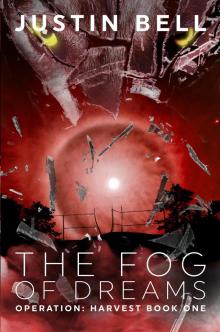 The Fog of Dreams
The Fog of Dreams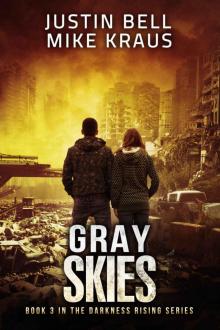 Gray Skies
Gray Skies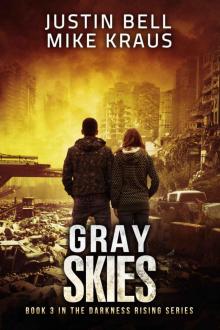 Gray Skies_the Thrilling Post-Apocalyptic Survival Series
Gray Skies_the Thrilling Post-Apocalyptic Survival Series Birth of Rebellion (War of the Three Planets Book 4)
Birth of Rebellion (War of the Three Planets Book 4)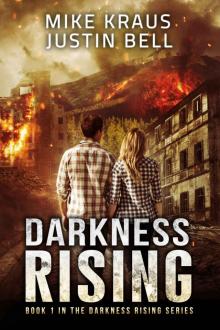 Darkness Rising
Darkness Rising Scorched Earth: Book 2 in the Thrilling Post-Apocalyptic Survival Series: (Zero Hour - Book 2)
Scorched Earth: Book 2 in the Thrilling Post-Apocalyptic Survival Series: (Zero Hour - Book 2)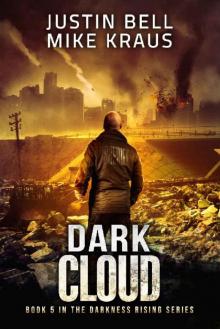 Dark Cloud: Book 5 in the Thrilling Post-Apocalyptic Survival Series: (Darkness Rising - Book 5)
Dark Cloud: Book 5 in the Thrilling Post-Apocalyptic Survival Series: (Darkness Rising - Book 5)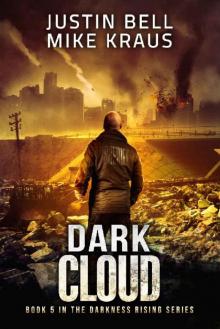 Dark Cloud_Thrilling Post-Apocalyptic Survival Series
Dark Cloud_Thrilling Post-Apocalyptic Survival Series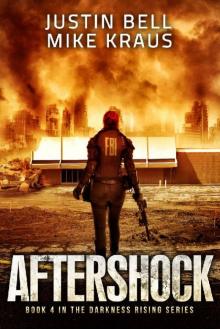 Aftershock: Book 4 in the Thrilling Post-Apocalyptic Survival Series: (Darkness Rising - Book 4)
Aftershock: Book 4 in the Thrilling Post-Apocalyptic Survival Series: (Darkness Rising - Book 4) Aftershock
Aftershock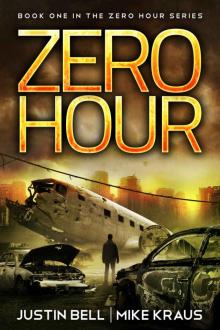 Zero Hour: Book 1 in the Thrilling Post-Apocalyptic Survival Series: (Zero Hour - Book 1)
Zero Hour: Book 1 in the Thrilling Post-Apocalyptic Survival Series: (Zero Hour - Book 1)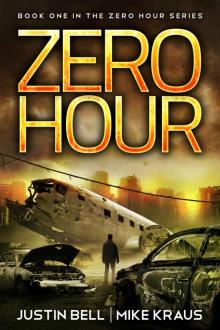 Zero Hour_Thrilling Post-Apocalyptic Survival Series
Zero Hour_Thrilling Post-Apocalyptic Survival Series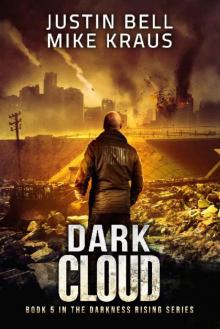 Dark Cloud
Dark Cloud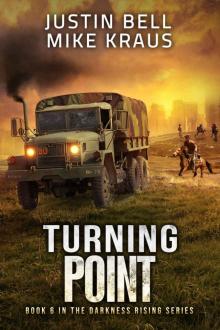 Turning Point: Book 6 in the Thrilling Post-Apocalyptic Survival Series: (Darkness Rising - Book 6)
Turning Point: Book 6 in the Thrilling Post-Apocalyptic Survival Series: (Darkness Rising - Book 6)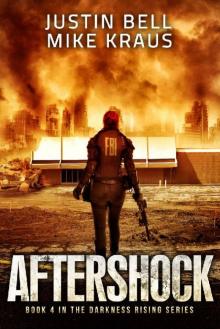 Aftershock_the Thrilling Post-Apocalyptic Survival Series
Aftershock_the Thrilling Post-Apocalyptic Survival Series War of the Three Planets Collection (Book 01)
War of the Three Planets Collection (Book 01) Stars on Fire
Stars on Fire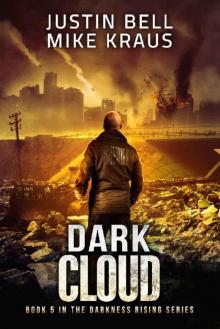 Dark Cloud_the Thrilling Post-Apocalyptic Survival Series
Dark Cloud_the Thrilling Post-Apocalyptic Survival Series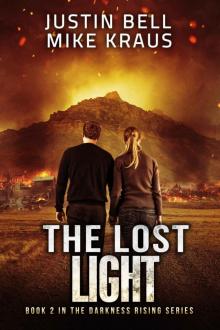 The Lost Light
The Lost Light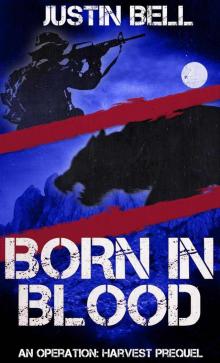 Born in Blood
Born in Blood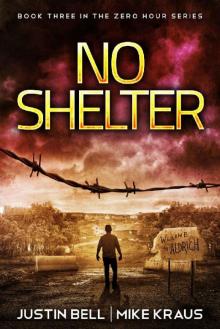 No Shelter: Book 3 in the Thrilling Post-Apocalyptic Survival Series: (Zero Hour - Book 3)
No Shelter: Book 3 in the Thrilling Post-Apocalyptic Survival Series: (Zero Hour - Book 3) Iridium Attacks
Iridium Attacks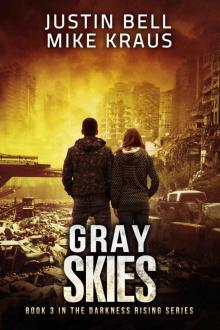 Gray Skies: Book 3 in the Thrilling Post-Apocalyptic Survival Series: (Darkness Rising - Book 3)
Gray Skies: Book 3 in the Thrilling Post-Apocalyptic Survival Series: (Darkness Rising - Book 3) It's Always Darkest
It's Always Darkest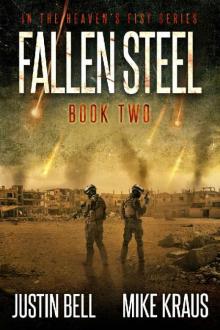 Fallen Steel: Book 2 in the Thrilling Post-Apocalyptic Survival Series: (Heaven's Fist - Book 2)
Fallen Steel: Book 2 in the Thrilling Post-Apocalyptic Survival Series: (Heaven's Fist - Book 2)